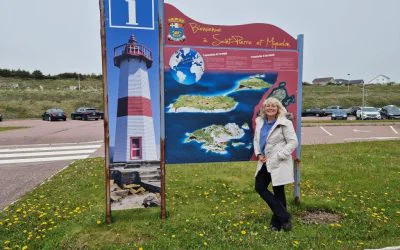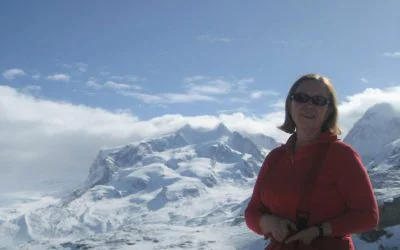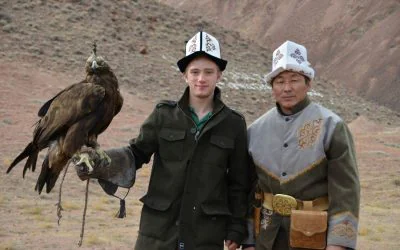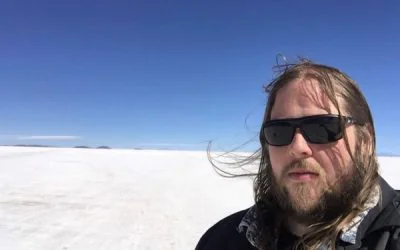Sue had to content herself with holidays in British resorts as a child; but as an adult she has most certainly gone very far and wide. Enthusiastic and curious about the world, this solo traveller and founder of Because It’s There tells us a little about her feelings toward travel.

Xinjiang, the start of the Karakorum Highway
Sue, tell us something about your early years and how your love of travel developed.
I’ve wanted to travel and see what’s out there ever since I was small. I don’t know why, though I’ve read that some people have a curiosity gene. As a family, we holidayed in British seaside resorts, if at all. I thought I had died and gone to heaven when I made my first trip abroad aged 11. A school day trip to Dieppe. And I could have died. (Perhaps.) There was a huge storm in the Channel. Not the last time that happened to me either, though on the second occasion I was on a 26 foot catamaran on the same stretch of water, it was gusting 11 and it was a decidedly more dubious situation. Since then I’ve survived thievery, volcanic eruptions, landslides and aircraft engine failure. I’ve been to hospital in Tibet, had my appendix out in Kathmandu and my leg has been encased in plaster after I fell off a waterfall in Venezuela. It hasn’t put me off. It’s a risky business living and driving in the UK too, at times. And I’ve been robbed more often in London than I have abroad.
Another border, another country. As fast as I complete my bucket list, travellers I meet tell me about new fabulous possible destinations. I’ve done thee month trips thinking ‘This will cure me’, but the sense of something new round very corner just makes me worse. When I’m home, my spare time is taken up planning my next trips.
Now my goal of visiting every country in the world looks possible. I have a plan… tempus fugit.
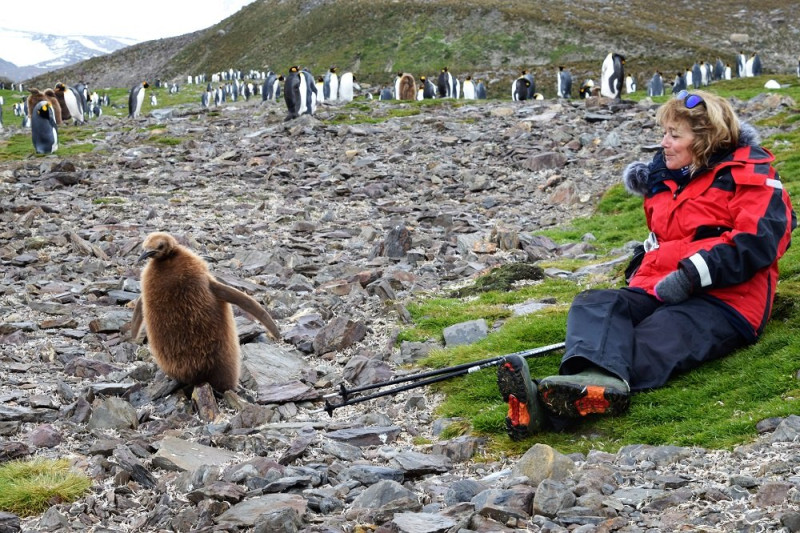
South Georgia
As a woman travelling alone, what are the specific challenges that trying to conquer the world presents and what are some of the rewards?
When I tell people I’m travelling, usually on my own, the stock response is ‘Aren’t you brave’? I first travelled on my own, to Germany, on the train, when I was 15, so you might say I’m used to it. But, weeks before I make a trip, even now, I’m usually in a total funk, wondering what on earth I’m doing going to remote lands no-one here has ever heard of, on the other side of the world, alone. I get so anxious I pack all the wrong things and a result my bag is always overstuffed and cumbersome.
Reading articles about attacks made on women travelling solo – there was a New York Times article circulating on Stamp the Passport recently- can raise anxiety levels. I try to put this sort of thing to one side and assess the risks sensibly. In developing countries – especially FCO red zones- I pay for a guide and often a driver too. I don’t go out on my own at night without checking whether the area is considered safe. I often spend the evenings sorting my photographs and writing my blog – www.because-its-there.uk
I’ve had a lot of minor aggravation, verbal ‘offers’, polite ‘invitations’ sometimes people are selling stuff, at others their goal is somewhat different. I’ve got blonde hair and I attract attention. Fortunately, I’ve never had any major issues because I was travelling solo. The worst time was when I had to manhandle my Bhutanese guide away from my bungalow door. Luckily, he went, and hugely embarrassed, didn’t turn up to take me to the airport next morning. I’ve been in more danger from physical risks in small groups – dodgy Land Rovers with slipping clutches and maniac driving up hairpin-bend-mountain tracks in the Karakorum, for example.
Sometimes it’s a little lonely. But I’ve learned that I don’t need to share an experience to understand that this planet is a wonderful place. I’m the one in charge, so I can do what I want, when I want. I don’t need to feel guilty if I don’t wish to visit a museum (I would rather stay outdoors) or listen to a guide (they often talk too much when I just want to look and I have the Internet for information, which is often more accurate anyway) or motor round a city when I’m not that inspired, or stay longer (or return) when I am. I don’t have to conform to anyone else’s notion of what it means to travel, where I should stay or how long for.
At times I have to summon up my courage and initiate a conversation. There are nearly always fascinating people to meet and talk to and then move on. Train dining cars are good. Sometimes, we stay in touch and swap travel stories, or even take a trip together. If I’m not in the mood for talk I put on my headphones and take a book. They’re a good back up for quiet (or bustling) dining rooms. If terrain or organisation looks overly challenging (or regulations demand it – like North Korea), I might get a tour custom made, or I might join a group tour for a short while, for one leg of a longer trip. Enjoyment of a group tour, I’ve discovered, is hugely dependent on the quality of the leader/guide. And more often than not I come away thinking ‘I could easily have done that on my own after all’.
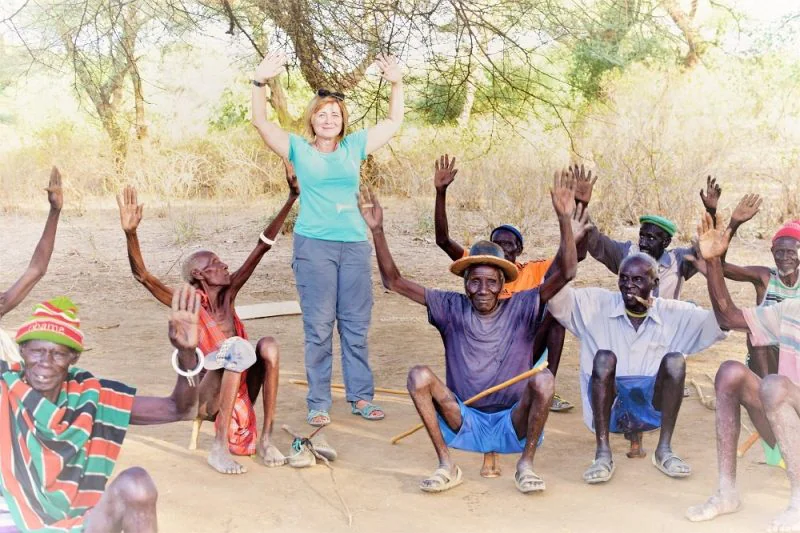
Toposi village, South Sudan
How do you like to travel? And why is this your preferred style?
I don’t think I’m your typical passport stamp collector. I sold my flat in Putney and bought more cheaply in Brighton to fund my travelling. I had to, because as I’ve got older comfort has become increasingly important. For reasons of economy, my first long journeys were basic camping trips across Europe with a two man tent. But I don’t enjoy getting dirty, or back-aches from sleeping on hard ground and I hate wandering around looking for the toilet in the middle of the night. So I go for mid-range (or better) local hotels of character when I can, avoiding soulless chains that all aspire to look as if they’re in America.
Most of the countries I still have to visit are in Africa. They usually involve visas that are a minefield of bureaucracy (and expense), less hospitable terrain and unpredictable accommodation. So, I chunk up my travel, returning home to file more visa applications, earn a little more money (I’m an education consultant) and market my flat on Airbnb – I rent it out while I’m away and then venturing out again.
This necessitates quite a lot of flying (I spend my air miles to upgrade when I can). I would always opt for overland (especially train) preferably, not least, because I’m terrified of turbulence. It’s a fear I’m learning to conquer, finally, although large quantities of Rescue Remedy (or gin and tonic) are required.
Frankly, I’m scared of so many things, at times I ask myself I wonder why I travel at all. Then that curiosity gene kicks in again and just remind myself that I always love it when I get there. And I do.
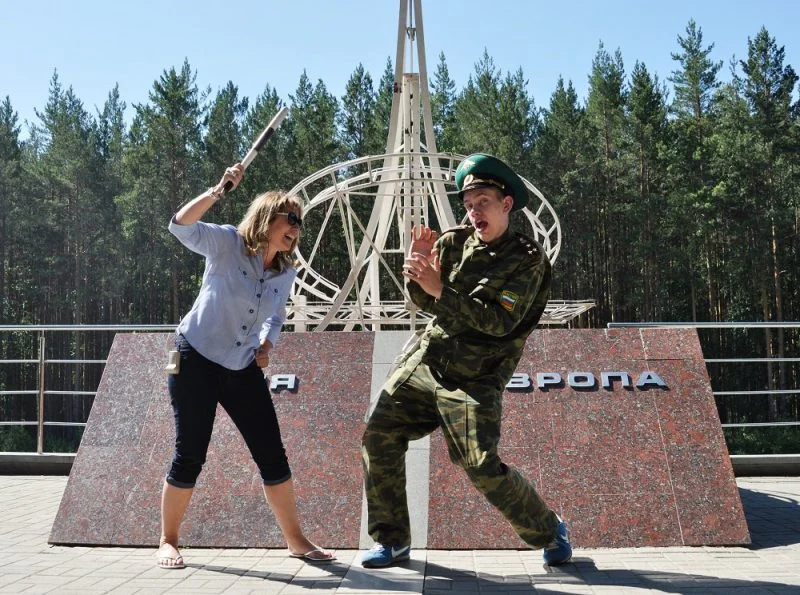
Russia continental divide
Do you feel that travelling has changed you in some ways and if so how? And how do you feel that locals perceive you as a traveller? Do you believe that being British results in a specific reaction?
Firstly, it’s made me so much more self-reliant and independent. I’ve also become far more patient and tolerant ( I hope). I love seeing geopolitics at first hand and trying to understand how countries and borders have evolved the way they have, Peter Hopkirk’s The Great Game was a brilliant read on the Silk Road, as is Tim Marshall’s Prisoners of Geography.
I’ve become far more aware of the subordination of women across the globe and cultural pressures and teaching that too often ensures women’s acceptance of their role. A young, university educated man in Iran told me that women should wear headscarves because they ‘look better in them’. Women in Somaliland remonstrated with me when I went out wearing trousers – the men were, on the whole, much less bothered. It depresses me to see how far and fast the aspiration towards materialism and celebrity is spreading. Though I start to challenge my assumptions about what constitutes a good life when I see how happy and content people in developing countries often are.
I used to read up everything before I went and compile lists of must-sees, but I’ve learned that it’s better not to travel with any specific expectations and I sometimes don’t even read guide books, other than for practical information and just see what happens when I get there. The reward is often strange fauna, extraordinary landscapes, diverse customs, colourful festivals, amazing places to relax in.
On the whole I’ve been welcomed as a traveller. Most people I meet are very pleased that I’ve shown an interest in their country, though in some places, like South Sudan, the concept of tourism is totally foreign. I was warned not even to think about taking out my camera in Juba, where photography equates with spying.
A single woman travelling solo is a concept that frequently evokes both pity and bewilderment. At Kathmandu Airport, I was taken into a curtained alcove to be security checked. ‘Are you married? How many children do you have?’ inquired the official. ‘I’m not, I said.’ No children. ‘Oh I’m so sorry,’ she exclaimed and forgot to search me. Sometimes I just invent husbands and hordes of children, who I’ve left at home. That story is accepted much more readily.
It makes me realise how I lucky I’ve been growing up in the UK, even though our current politics are also a cause for confusion on their part and – embarrassment, on my part, when I’m abroad. I’m questioned repeatedly about Brexit. It was all the officer at the Somaliland Embassy wanted to talk about when I went for my visa. He didn’t ask me anything about my proposed journey.
I’ve been on the receiving end of some abuse as a British or European traveller. I’ve been told to ‘Go home!’ both politely, in Arabic and in much more colourful Anglo Saxon English. I’ve had rocks hurled at my bus in Jordan (Sadaam Hussein had just invaded Kuwait and I was one of the last remaining tourists.) More frequently, I’ve been welcomed, especially, to my surprise, in ex-British colonies, where fond reminiscences have been common. In Bangladesh, my guide told me that it was commonplace to describe someone as ‘being English’ if they had a good idea. In Somaliland, the locals queued up to tell me, in very broken English, and with very big smiles, that they were once a British Protectorate. The peak of G’an Libah looking out across the desert to the Gulf of Aden is most notably ‘where the British drank their tea’.
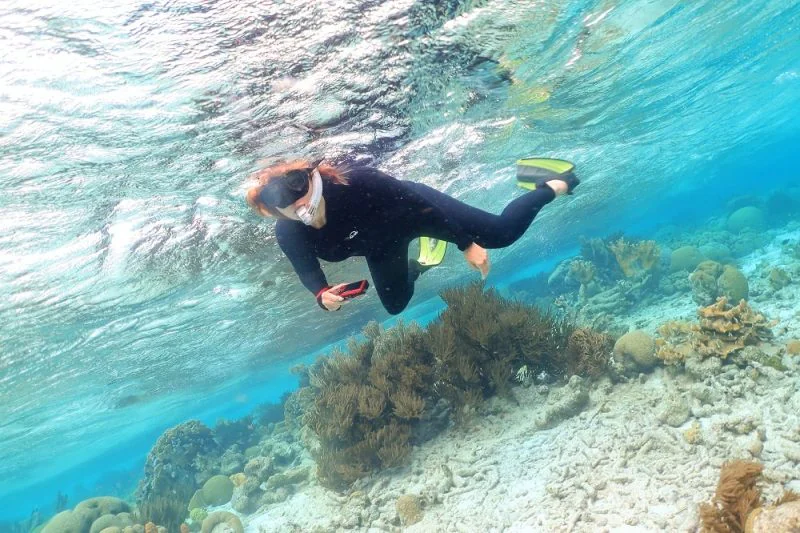
Bonaire
How well do you know your own country? What are some gems that you would recommend that most travellers may not know about?
I’ve travelled all round the UK, but not for some time. I’m saving further exploration, along with more in Europe, for the days when long haul starts to become too arduous. Great Britain has, rightly, been voted the most diverse island in the world and the scenery, is indeed, ever changing. A different view round every corner. My favourite part is the wilderness of Sutherland, in the very northwest of Scotland;, Suilven, craggy above the stark landscape. Dramatic and desolate Loch Torridon; pristine beaches, puffins diving in the surf, glorious in June or September sunshine.
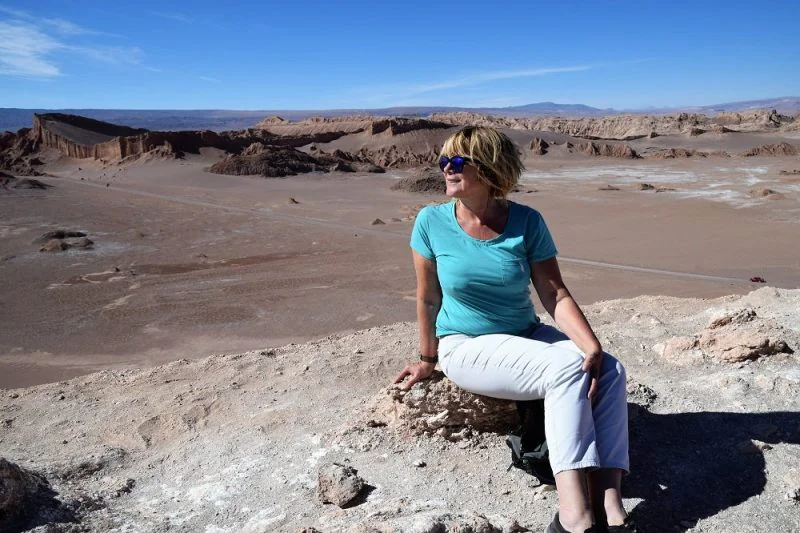
Atacama desert, Chile
Have you met many other solo travellers on your travels? And what about solo women travellers? Do you feel there is something that links all these people in their desire to travel solo?
I’ve met hundreds of other solo travellers. Both men and women will converse, but in my experience, women are more likely to engage or adjourn to a local hostelry to swap stories about this trip and make suggestions for others. Men are more likely to suggest that I spend a day or two sightseeing with them. Often a companion is welcome, as long as there are no strings attached. Most of the folk who follow my blogs are people I’ve met around the globe. I correspond with them and occasionally we meet and travel again. This summer I’m staying, in Sydney, with Petra, who I met on-board ship in Antarctica. I once went off to Myanmar for a fortnight with Nick, a guy I first encountered in Indonesia.
But mostly, we socialise briefly and move on. Ships in the night. We’re solo travellers for a reason.
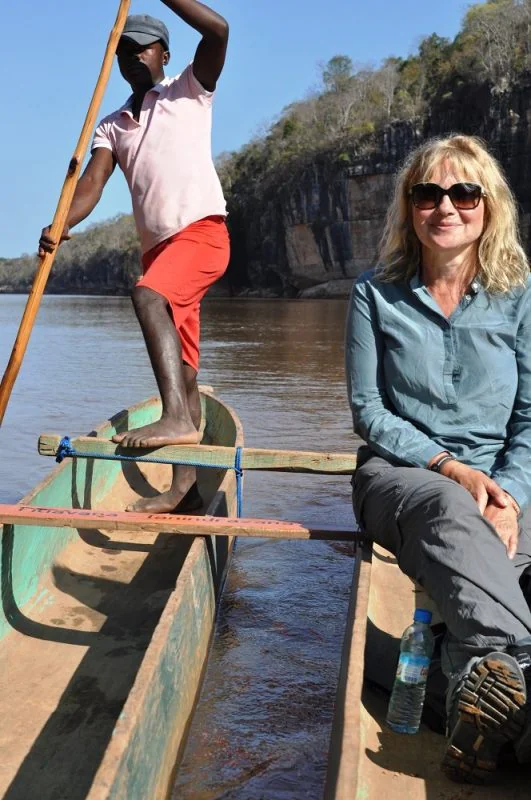
Madagascar
Of the places you have been to, which ones have you felt were really rewarding and which ones were most exhausting?
A recent trip to Uyuni in Bolivia travelling up from the Chilean Atacama, was unexpectedly stunning- amazing unique and surreal scenery. Scenery is the main draw for me. I always love tropical beaches and lagoons (boating across Aitutaki in the Cook Islands, swimming with rays in Tuvalu or viewing Bora Bora from the air) and tropical limestone coastal scenery (canoeing and snorkelling round El Nido in Palawan in the Philippines, or flying over the islands of Palau). Mountains are equally enticing. The Andes are my favourite- especially the jaggedly spectacular peaks and glaciers of Patagonia.
Viewing animals is always enthralling, whether it’s the Big (or Ugly) Five in Africa, endearing fluffy penguins and extravaganzas of whales in Antarctica or delicate guanacos on the salt pans of Bolivia. People watching, everywhere, is endlessly fascinating. Trying to persuade them into unselfconscious poses for my camera. India has been a huge draw. I’ve been ten times, but it’s a love -hate relationship and each time I swear I’m never going back. Number one spot in India has to be Varanasi- the light on the ghats at dawn, the ethereal music, the spiritual peace.
I could go on all day, so I’ll stop there…
The most exhausting place I’ve been to? That’s easy- DRC. I went for nine days when two would have been plenty. I was told Virunga was off limits and was driven to Boma instead. One long catalogue of dirt, litter, broken down cars, driver on alcohol and constant police harassment. It’s all on the blog: https://www.because-its-there.uk/drc
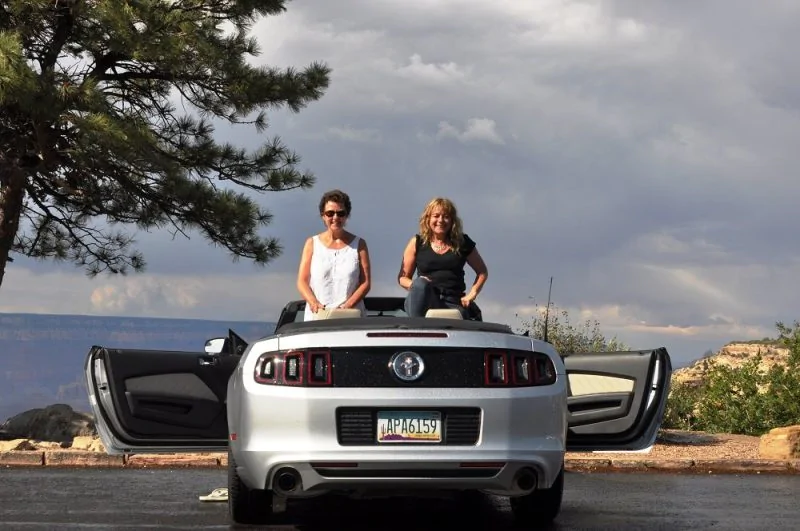
Being Thelma and Louise at Grand Canyon, Route 66, U.S.
So what are trips do you have planned for the near future?
Countries number 172 to 174 are coming up. (I count from UN 193 +3, so I need 196 in all).
And here’s my 2019/2020 plan for the others. Yemen’s been left to the end for a reason!
| June | Gabon, (172) Angola, (173) Sao Tome (174) |
| July/Aug | East Timor (175), Niue, Cocos Keeling Islands, Christmas Island, Norfolk Island, Tasmania, The Ghan |
| Oct | Bahrain (176) Saudi (177) |
| Dec/Jan | Western Sahara, Mauritania (178), Senegal, Guinea-Bissau (179), Guinea (180), Sierra Leone (181) Liberia (182), Mali, (183), Ivory Coast (184), Togo (185), Benin (186), Nigeria (187), Niger (188) |
| Feb 2020 | Cameroon (189), Chad (190), Equatorial Guinea (191) |
| July/Aug | Central African Republic (192), Burundi (193) |
| Autumn/onwards | Afghanistan (194), Iraq (195), Yemen (196) |
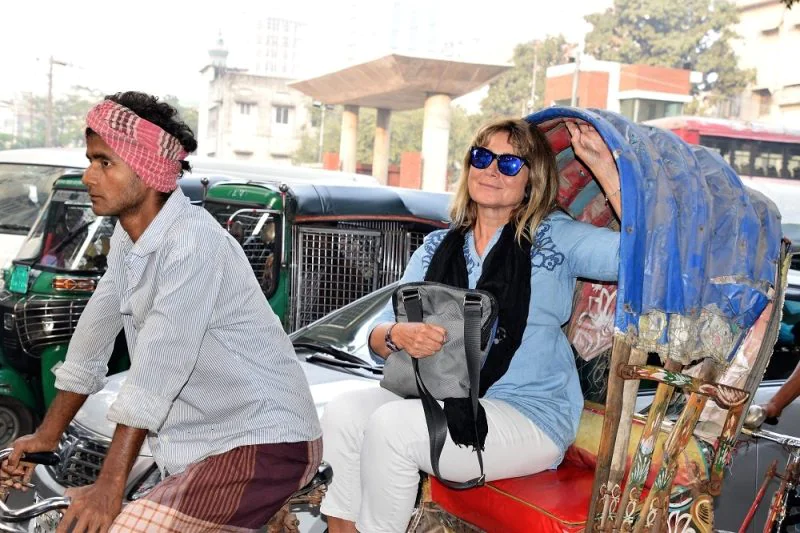
Dhaka, Bangladesh
And our signature question – if you could invite any four people from any period in human history to dinner, who would you invite and why?
Alexander the Great, Julius Caesar, Catherine the Great and Daenerys Targaryen. All empire builders through exploration, as well as battle, with a huge legacy in geopolitics today, and utterly fascinating to read about. Though I’m a little daunted at the idea of managing all four of them together.
Alternatively, Brad Pitt, Ryan Gosling, Jerome Flynn and Bradley Cooper. But one at a time.
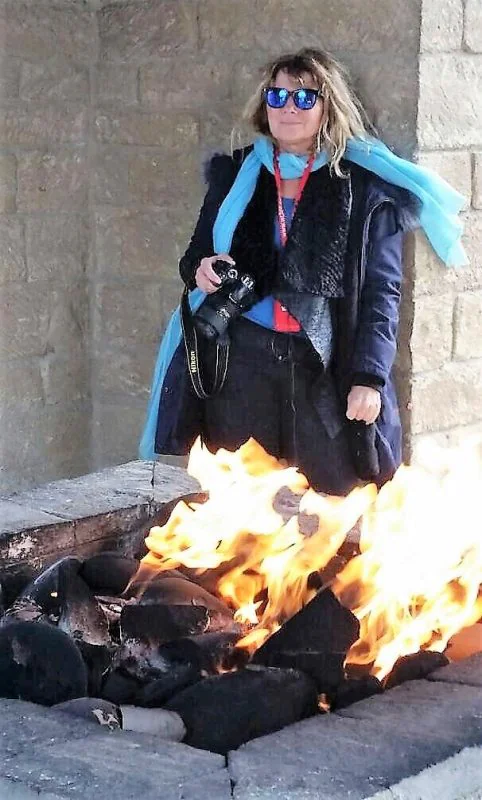
Baku, Zoroastrian Temple
The photos in this interview are from Sue’s personal collection and we thank her for sharing her images with us here at NomadMania! Sue’s virtual home is at Because It’s There.
